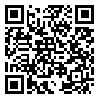BibTeX | RIS | EndNote | Medlars | ProCite | Reference Manager | RefWorks
Send citation to:
URL: http://rehabilitationj.uswr.ac.ir/article-1-435-en.html
Objective: One of the main factor sinfluencing chronicity and disability in low back pain is pain related fear and fear of movement. It was shown that fear of pain is more disabling than the pain itself. The purpose of this study was to evaluate the psychometric properties of Tampa Scale of Kinesiophobia – Iranian version (TSK-IV) which is one of the most common instruments for measuring fear of movement and reinjury.
Materials & Methods: In this descriptive and methodologic study which is a tool making and validity testing research, 232 low back pain patients were selected simply from some hospitals and clinics in Tehran. Among these patients 61 patients, participated for retest after seven days. To evaluate psychometric properties of TSK–IV, internal consistency, item-total correlation, test-retest reliability and construct validity were measured. The tools which were used included TSK to measure fear of movement, VAS for measuring pain intensity, Fear-Avoidance Beliefs Questionnaires (FABQ) for measuring the physical activity and work related fear and Roland Morris Disability Questionnaire (RDQ) to measure perceived disability were used.
Results: TSK-Iranian version yielded acceptable values for internal consistency. Cronbach’s Alpha was 0.796 in 17 items of TSK. Item-total correlation was in acceptable range except for four items. ICC between the first test and retest was 0.86. There was a moderate correlation between TSK and FABQ-PA and FABQ-W respectively 0.59 and 0.32. TSK and disability measure using RMDQ correlated (r=0.60) moderately.
Conclusion: The Iranian version of TSK is a reliable and valid instrument for measuring fear of movement and injury in low back pain patients, similarly to its original English version. This instrument can be used in clinical environment and also for research purposes
Received: 15/03/2010 | Accepted: 9/12/2014 | Published: 9/12/2014
| Rights and permissions | |
 |
This work is licensed under a Creative Commons Attribution-NonCommercial 4.0 International License. |





